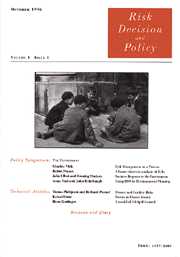Crossref Citations
This article has been cited by the following publications. This list is generated based on data provided by Crossref.
Denneberg, Dieter
2002.
Conditional expectation for monotone measures, the discrete case.
Journal of Mathematical Economics,
Vol. 37,
Issue. 2,
p.
105.
Abdellaoui, Mohammed
and
Wakker, Peter P.
2005.
The Likelihood Method for Decision under Uncertainty.
Theory and Decision,
Vol. 58,
Issue. 1,
p.
3.
Antoniou, Constantinos
Read, Daniel
and
Galariotis, Emilios C.
2010.
Ambiguity Aversion, Company Size and the Pricing of Earnings Forecasts.
SSRN Electronic Journal,
Cohen, Michèle
Chateauneuf, Alain
Danan, Eric
Gajdos, Thibault
Giraud, Raphaël
Jeleva, Meglena
Philippe, Fabrice
Tallon, Jean-Marc
and
Vergnaud, Jean-Christophe
2011.
Tribute to Jean-Yves Jaffray.
Theory and Decision,
Vol. 71,
Issue. 1,
p.
1.
Zimper, Alexander
2011.
Do Bayesians Learn Their Way Out of Ambiguity?.
Decision Analysis,
Vol. 8,
Issue. 4,
p.
269.
Eichberger, Jürgen
Grant, Simon
and
Kelsey, David
2012.
When is ambiguity–attitude constant?.
Journal of Risk and Uncertainty,
Vol. 45,
Issue. 3,
p.
239.
Dominiak, Adam
Duersch, Peter
and
Lefort, Jean-Philippe
2012.
A dynamic Ellsberg urn experiment.
Games and Economic Behavior,
Vol. 75,
Issue. 2,
p.
625.
Zimper, Alexander
2012.
Asset pricing in a Lucas fruit-tree economy with the best and worst in mind.
Journal of Economic Dynamics and Control,
Vol. 36,
Issue. 4,
p.
610.
Zimper, Alexander
2013.
The emergence of “fifty–fifty” probability judgments through Bayesian updating under ambiguity.
Fuzzy Sets and Systems,
Vol. 223,
Issue. ,
p.
72.
Ludwig, Alexander
and
Zimper, Alexander
2013.
A decision-theoretic model of asset-price underreaction and overreaction to dividend news.
Annals of Finance,
Vol. 9,
Issue. 4,
p.
625.
Antoniou, Constantinos
Galariotis, Emilios C.
and
Read, Daniel
2014.
Ambiguity Aversion, Company Size and the Pricing of Earnings Forecasts.
European Financial Management,
Vol. 20,
Issue. 3,
p.
633.
Ludwig, Alexander
and
Zimper, Alexander
2014.
Biased Bayesian learning with an application to the risk-free rate puzzle.
Journal of Economic Dynamics and Control,
Vol. 39,
Issue. ,
p.
79.
Eichberger, Jürgen
Oechssler, Jörg
and
Schnedler, Wendelin
2015.
How do subjects view multiple sources of ambiguity?.
Theory and Decision,
Vol. 78,
Issue. 3,
p.
339.
Vinogradov, Dmitri mname
and
Makhlouf, Yousef mname
2017.
Signaling Probabilities in Ambiguity: On the Impact of Vague News.
SSRN Electronic Journal,
Baillon, Aurélien
Bleichrodt, Han
Keskin, Umut
l’Haridon, Olivier
and
Li, Chen
2018.
The Effect of Learning on Ambiguity Attitudes.
Management Science,
Vol. 64,
Issue. 5,
p.
2181.
Bellemare, Charles
Kröger, Sabine
and
Sossou, Kouamé Marius
2018.
Reporting probabilistic expectations with dynamic uncertainty about possible distributions.
Journal of Risk and Uncertainty,
Vol. 57,
Issue. 2,
p.
153.
Ellis, Andrew
2018.
On dynamic consistency in ambiguous games.
Games and Economic Behavior,
Vol. 111,
Issue. ,
p.
241.
Tian, Jing
and
Resconi, Germano
2019.
Morphogenetic Updating Algorithm and its Application in Updating Probabilistic Risk.
International Journal of Pattern Recognition and Artificial Intelligence,
Vol. 33,
Issue. 07,
p.
1950008.
Carbone, Enrica
Georgalos, Konstantinos
and
Infante, Gerardo
2019.
Individual vs. group decision-making: an experiment on dynamic choice under risk and ambiguity.
Theory and Decision,
Vol. 87,
Issue. 1,
p.
87.
Georgalos, Konstantinos
2019.
An experimental test of the predictive power of dynamic ambiguity models.
Journal of Risk and Uncertainty,
Vol. 59,
Issue. 1,
p.
51.

